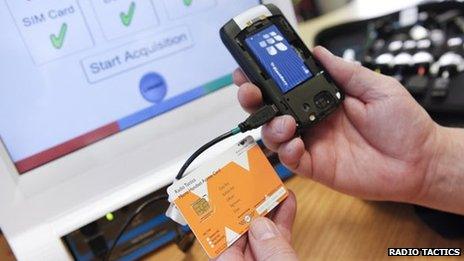Met Police to extract suspects' mobile phone data
- Published

The kiosks have been fitted in 16 London boroughs for a 12-month trial
The Metropolitan Police has implemented a system to extract mobile phone data from suspects held in custody.
The data includes call history, texts and contacts, and the BBC has learned that it will be retained regardless of whether any charges are brought.
The technology is being used in 16 London boroughs, and could potentially be used by police across the UK.
Campaign group Privacy International described the move as a "possible breach of human rights law".
Until now, officers had to send mobiles off for forensic examination in order to gather and store data, a process which took several weeks.
Under the new system, content will be extracted using purpose built terminals in police stations.
It will allow officers to connect a suspect's mobile and produce a print out of data from the device, as well as saving digital records of the content.
'Retained and handled'
A Met Police spokesman told the BBC that when a suspect was released, "data received from the handsets is retained and handled in accordance with other data held by the MPS [Metropolitan Police Service]" - regardless of whether charges had been brought.
Guidelines given to officers state that data extraction can happen only if there is sufficient suspicion the mobile phone was used for criminal activity.
"Mobile phones and other devices are increasingly being used in all levels of criminal activity," said Stephen Kavanagh, Deputy Assistant Commissioner of the Metropolitan Police Service.
"When a suspect is arrested and found with a mobile phone that we suspect may have been used in crime, traditionally we submit it to our digital forensic laboratory for analysis.
"Therefore, a solution located within the boroughs that enables trained officers to examine devices and gives immediate access to the data in that handset is welcomed."
'Illegal'
Over 300 London officers will be trained in using the "intuitive, fully-guided touchscreen desktop data acquisition tool", created by mobile forensic firm Radio Tactics.
The cost of leasing the 16 terminals for 12 months and training the officers will be £50,000, the Met said.

Privacy International has warned against the possibility of such tech eventually be used on the streets
Privacy International has expressed serious concern over the system.
"We are looking at a possible breach of human rights law," spokeswoman Emma Draper told the BBC.
"It is illegal to indefinitely retain the DNA profiles of individuals after they are acquitted or released without charge, and the communications, photos and location data contained in most people's smartphones is at least as valuable and as personal as DNA."
Ms Draper added that while the Met's current plans were limited to fixed extraction terminals in stations, portable technology was readily available.
"Examining suspects' mobile phones after they are arrested is one thing, but if this technology was to be taken out onto the streets and used in stop-and-searches, that would be a significant and disturbing expansion of police powers."
- Published10 May 2012
- Published4 May 2012